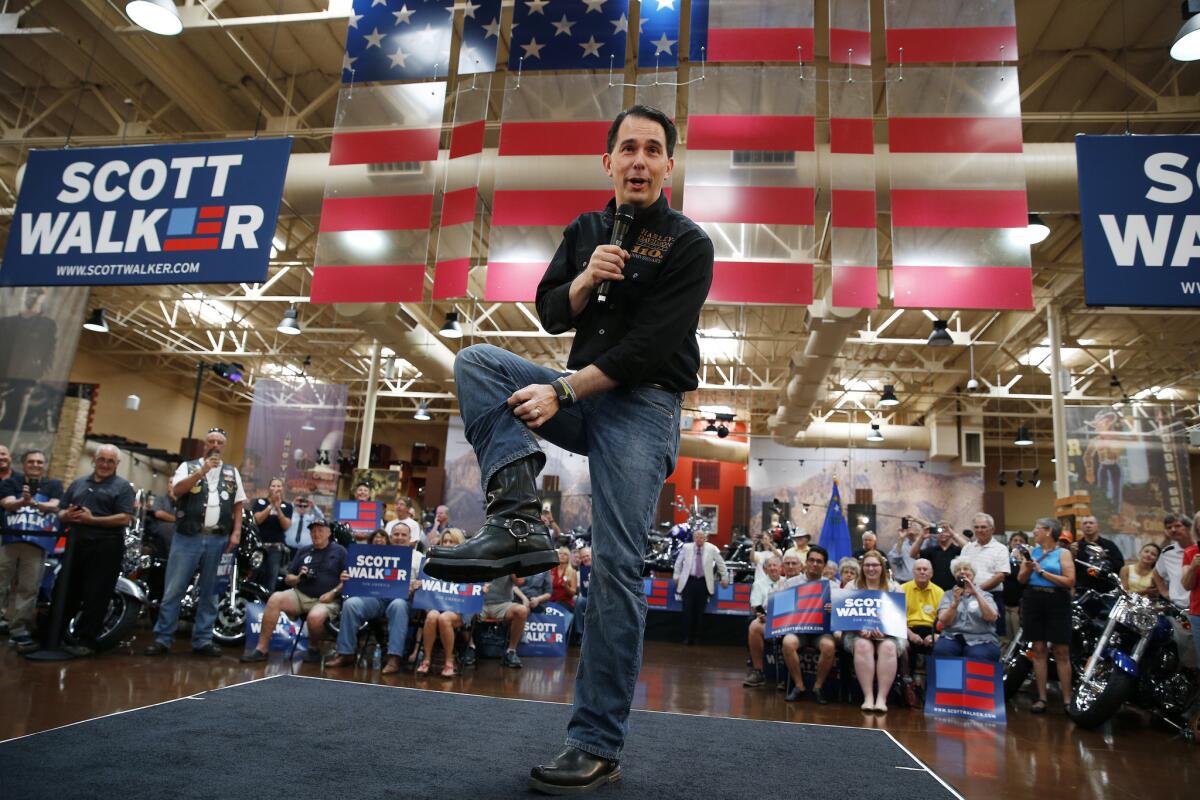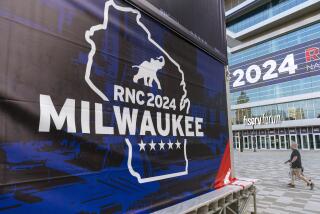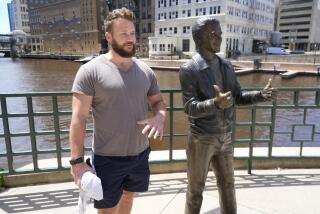Scott Walker tries to prove he’s a national contender for president

Wisconsin Gov. Scott Walker shows off his motorcycle boots during a campaign event at a Harley-Davidson dealership in Las Vegas, one of several stops he made at the company’s dealerships during his first week on the presidential campaign trail.
- Share via
Reporting from North Charleston, S.C. — As he rumbled through South Carolina this week, Wisconsin Gov. Scott Walker told his favorite story about shopping for clothes at Kohl’s department store and cobbling together so many discounts that “they’re paying me to buy the shirt.”
The tale drew chuckles from some of the 200 Republicans who came to see him at a Harley-Davidson dealership in North Charleston. But the details, including references to the “Kohl’s cash” coupons found in his wife’s purse, did not spark the same knowing nods that they did during his announcement speech in Wisconsin, where the chain is based and is a more entrenched symbol of middle-class culture.
GRAPHIC: Who’s running for president in 2016?
The stump-speech anecdote points to one of Walker’s challenges as he opened his campaign for president by embarking on a whirlwind tour: proving he is a national contender who can win states beyond his Midwestern base.
He is investing time, money and organizational resources in Iowa, which holds the nation’s first presidential nominating contest and borders his home state. But to rise above other leading Republican candidates, he needs to show strength in other regions of the country that have early primaries, including South Carolina.
“Fifty percent of the people in South Carolina, you show them a picture of Scott Walker and they don’t know who he is,” said Moye Graham, chairman of the Republican Party for a state district that covers 15 counties north of Charleston. “He probably has the least face recognition of the major candidates.”
Walker, hoping to remedy that problem, pursued an aggressive schedule in early primary states for his first week, with stops in Nevada, South Carolina, Georgia, New Hampshire and Iowa, followed next week by trips to Tennessee, California and North Carolina, and a return trip to New Hampshire for a motorcycle tour. Walker was hoarse during his first appearance in South Carolina after going without a bed for more than 24 hours.
Trying to save money and reinforce his Everyman credentials, he and his staff flew commercial but ran into delays caused by weather, including an unexpected stop in Memphis, a missed connection in Atlanta and a 3 a.m. ride in a rented van to South Carolina.
Polls have suggested Walker can compete in South Carolina and other early states. And many GOP activists in South Carolina, where Republican primary voters are especially conservative, also say he has a shot. But several have said he will have to visit more often — something he pledged to do this week — and distinguish himself from a crowded field that includes Sen. Lindsey Graham, who represents South Carolina, and Sen. Marco Rubio of Florida, who has a strong network in the state. Other very conservative candidates, including Dr. Ben Carson, real estate magnate Donald Trump and former Texas Gov. Rick Perry, are also mentioned favorably by activists here.
“There’s just so many candidates,” said Brian Grant, a 47-year-old pharmacist from Charleston who came to check Walker out at the Harley-Davidson event. “Nobody’s narrowed it down.”
And South Carolina voters do not always honor the winners of other early primaries with a bounce. Newt Gingrich, the former speaker of the House, won the primary here in 2012, stanching the momentum of Rick Santorum, the former Pennsylvania senator, who won Iowa.
“He was completely reliant on the bump. It will help, but it never really works,” said Brandon Newton, a party chairman from a district based along the border with North Carolina. “It’s really who does the ground game in South Carolina.”
That’s where money and organization help candidates like Jeb Bush, the former Florida governor who has mainstream support and leads by a substantial margin in fundraising through outside groups.
“Your biggest challenge is time,” said Rick Wiley, Walker’s campaign manager, marking as the most difficult logistical hurdle a stretch of 26 contests in the first two weeks of March that will probably determine the party’s nominee.
Walker tries to connect with crowds, and draw a contrast with Bush, by emphasizing his humble roots, including a job at McDonald’s and his grandparents’ lack of indoor plumbing for a time. He wore jeans, rolled-up sleeves and motorcycle boots in South Carolina, one of three states where he scheduled events at Harley-Davidson dealerships, a nod to another Wisconsin-based company and to his hobby of motorcycle-riding that suggests a renegade streak. In North Charleston he stood before a backdrop of motorcycles stacked three stories high.
Many who took pictures and sought autographs from him after his speeches were eager to talk about their Wisconsin ties -- a few wore Green Bay Packers jerseys or carried the team’s mug.
Walker is one of the most polarizing candidates in the field, loathed by Democrats and union activists and admired by conservatives for defeating a recall effort after his rollback of collective bargaining rights for public employees in Wisconsin. That fight is the centerpiece of Walker’s speeches and the issue party activists know most about him.
“We took on the unions and we won,” Walker said in Lexington.
Walker has tried to move still further to the right to court social conservatives. His work to curtail abortion rights drew some of his loudest applause here, along with his boast of passing a voter-ID law and his fight to require welfare recipients to take drug tests.
Walker has tiptoed around issues that could risk alienating conservative voters, even if they are less controversial with moderates.
He has mostly sidestepped questions about whether South Carolina should have removed the Confederate flag from the capitol, calling it a state issue. That allowed him to avoid taking sides on a topic that remains divisive among the state’s Republicans.
To reporters, he praised Republican Gov. Nikki Haley for “bringing together a broad coalition to get the job done.”
Walker’s impulse to please cultural conservatives has prompted some awkward moments. On Tuesday, he was quoted as saying that he believed gay people should be barred from leading Boy Scout troops because the policy “protected children and advanced Scout values.”
But speaking to reporters on Wednesday, Walker downplayed his comment.
“It’s up to the Boy Scouts,” he said. “All I pointed out was the policy was perfectly fine when I was there and I thought they should be protected from all the political and media controversy about it.”
For more campaign coverage, follow @noahbierman.
More to Read
Sign up for Essential California
The most important California stories and recommendations in your inbox every morning.
You may occasionally receive promotional content from the Los Angeles Times.














